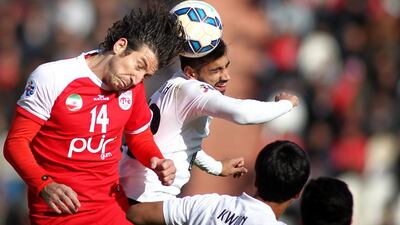Cosmin Olaroiu said his battling Al Ahli players did not deserve to end up on the losing side of their Asian Champions League clash against Tractor Sazi in Iran on Wednesday.
Held 3-3 at home by Al Ahli of Saudi Arabia in their opening Group D match, the Arabian Gulf League defending champions put up a determined fight in Tabriz after Farshad Ahmadzadeh had put the hosts ahead in the 40th minute when he booted home Fardin Abedini’s cross from the right.
"We didn't deserve to lose the game," said Olaroiu, whose team have gone winless in five matches in all competitions.
“It was a difficult match, and the Iranian team we played against was very strong.
“The atmosphere in the stadium made it difficult for us to play, however the opportunities we made outnumbered the chances made by the home side.
“We did our best in this tough situation. We lost the ball in the important areas of the field and that was where they took advantage from.”
The defeat left Ahli at the bottom of the group with one point from two matches. They host Uzbek side Nasaf Qarshi on March 18, with a win in that match needed to keep alive hope of reaching the last 16.
Fortune has not been on Ahli's side recently. Their last win came a month ago, against Sharjah in the AGL. Since then, they have lost to Al Shabab (1-0) and Al Wasl (4-0) in the domestic league, and drawn with Ajman (0-0) and Ahli of Saudi Arabia.
The visitors started the game with only two foreign players, Oussama Assaidi and Kwon Kyung-won, and deserved a bit more for their efforts.
They came out fighting after the break, dominating possession but failing to break down a resolute Tractor Sazi defence. Habib Fardan came closest to equalising, in the 57th minute, but was thwarted by the goalkeeper Hamed Lak.
“In the second period they had one good chance, but our goalie saved it well,” said Antonio Oliveira, the Tractor Sazi coach.
He said his team’s organisation had been too much for the Emirati side.
“We saw a highly tactical game and there were of course some mistakes,” Oliveira said, “but we had almost the entire game under our control.”
In the other Group D match, the Saudi Al Ahli beat Nasaf Qarshi 2-1 in Jeddah to go top of the group. Omar Al Soma and Saleh Al Jamaan scored for the hosts.
arizvi@thenational.ae
Follow us on Twitter at @NatSportUAE

